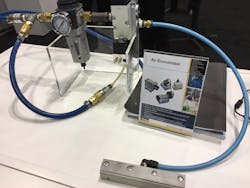While initially designed to limit energy expenditure and use less air, the device is growing in popularity on the factory floor because, when compared to uncontrolled blow-off in blowing applications, it provides higher productivity. In North America, this productivity benefit is now recognized as more important than the energy savings the valve was originally designed to provide.
ASUs save energy by interrupting the flow of compressed air to blowing end uses at adjustable frequencies. Rather than a steady stream of air, an ASU delivers a series of impulses, which offers a significant mechanical advantage. Because the ASU has an opportunity to recover during the “off” period of each on/off cycle, the impulses are delivered with somewhat greater force than a steady stream of air provides. Parker originally developed ASUs for the automotive industry as a way to save energy when blowing dust and other contaminants off of car bodies prior to painting. The unforeseen advantage of the on/off technique was its improved effectiveness for this application and its impact on the customer's productivity metrics.
In addition to the automotive industry, ASUs can boost productivity in a wide range of other applications, including the removal of cuttings, shavings, etc. (i.e., swarf) produced by machining processes; PET bottle transfer and cleaning; parts feeding/handling; particulate separation, laser cutting; and electronic assembly systems.
The Air Saver is available in port sizes ranging from M5 (5 CFM flow) to 1¼-inch (530 CFM flow). Other features include adjustable pulse frequency and duty cycles, a silicone-free grease version for paint shop applications, and an on time/off time adjustment needle. Contact Parker Hannifin for more information on this product and air saving application programs to help document energy savings using this product.
Leaders relevant to this article:

